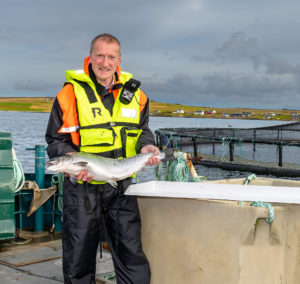Report highlights growth of aquaculture in Scotland’s marine economy

The annual contribution made by the aquaculture sector in Scotland to the national economy soared over the past decade, according to the latest Scottish Government statistics.
Scotland’s Marine Economic Statistics 2020, which has just been published, shows that gross value added (GVA) by the aquaculture sector rose from £206m in 2011 to £362m in 2020, up by 76%.
Employment in the sector also increased by nearly a third over the same period.
Trade body Salmon Scotland said the research shows that farm-raised salmon “generates vital wealth for the country”.
According to the Scottish Government findings, aquaculture was the third largest marine contributor in terms of GVA, only behind oil and gas, and construction and water transport services.
Farming accounted for 9.4% of the Scottish marine economy in 2020, compared to 7.3% for sea fishing at £284m.
In 2020, the marine economy generated £4bn in gross value added, representing – in the year the Covid-19 pandemic hit – a fall of 27% from 2019. The marine economy accounted for 2.8% of the overall Scottish economy.
In 2020, the marine economy employed 68,600 people, representing 2.6% of total Scottish employment.
Overall, between 2011 and 2020, gross value added by the marine economy fell by 24%.
Labour productivity (GVA per worker) for farming in the marine economy was second only to freight water transport in providing £151,565 per head.
Over the decade, farmers grew 1.9 million tonnes of fish worth £9bn, with production rising on average by 2.9% per cent year-on-year.
Atlantic salmon accounts for 96% of Scotland’s aquaculture value, with other finfish farming and shellfish, mainly mussels, making up the remainder. Recent HMRC data confirms that Scottish salmon is the UK’s largest food export.
Tavish Scott, chief executive of Salmon Scotland, said: “Scottish salmon generates vital wealth for the country, and specifically for our islands and Highland coastal communities.
“Farm-raised Scottish salmon is a global success story that everyone in Scotland can take pride in, putting the best-tasting and healthiest protein product on people’s plates and delivering the highest environmental and welfare standards.
“I pay tribute to the farmers and all those involved in the journey from egg to plate.
“All this has been achieved despite the incredible challenges of Covid and Brexit, and with the right government support – streamlined regulation, a more business-friendly approach to immigration in the post-Brexit environment, and action to tackle rural housing shortages – we can deliver further sustainable growth.”

Tavish Scott

